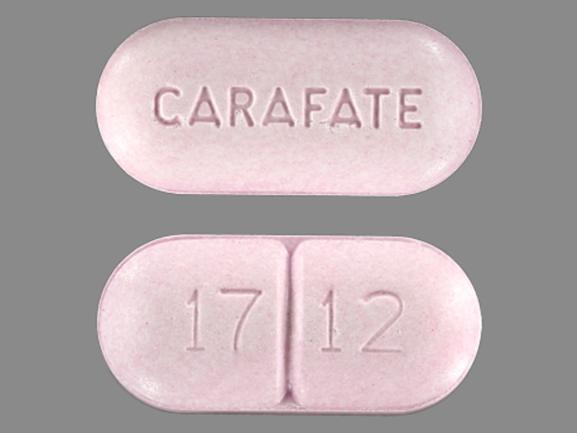Carafate
Generic name: sucralfate (oral) [ soo-KRAL-fate ]
Drug class: Miscellaneous GI agents
What is Carafate?
Carafate is an anti-ulcer medication.
Carafate is not greatly absorbed into the body through the digestive tract. It works mainly in the lining of the stomach by sticking to ulcer sites and protecting them from acids, enzymes, and bile salts.
Carafate is used to treat an active duodenal ulcer. Sucralfate can heal an active ulcer, but it will not prevent future ulcers from occurring.
Warnings
The liquid form of Carafate should never be injected through a needle into the body, or death may occur.
Follow all directions on your medicine label and package. Tell each of your healthcare providers about all your medical conditions, allergies, and all medicines you use.
Avoid taking any other medications within 2 hours before or after you take Carafate. Sucralfate can make it harder for your body to absorb other medications you take by mouth.
Before taking this medicine
You should not use Carafate if you are allergic to sucralfate.
To make sure this medicine is safe for you, tell your doctor if you have:
-
diabetes;
-
kidney disease (or if you are on dialysis); or
-
trouble swallowing tablets.
>Older adults may be more sensitive to the effects of sucralfate.
Tell your doctor if you are pregnant or breastfeeding.
Do not give Carafate to a child without medical advice.
Related/similar drugs
omeprazole, famotidine, pantoprazole, triamcinolone topical, Protonix, sucralfate, Nexium
How should I take Carafate?
Take Carafate exactly as prescribed by your doctor. Follow all directions on your prescription label and read all medication guides or instruction sheets.
Take this medicine on an empty stomach.
Shake the oral suspension (liquid) before you measure a dose. Use the dosing syringe provided, or use a medicine dose-measuring device (not a kitchen spoon).
If you are diabetic, check your blood sugar regularly. Your doctor may adjust your dose based on your blood sugar levels.
The liquid form of this medicine should never be injected through a needle into the body, or death may occur. Carafate oral suspension is to be taken only by mouth.
It may take 2 to 8 weeks before you receive the full benefit of taking Carafate. Use this medicine for the full prescribed length of time, even if your symptoms quickly improve.
Your doctor may want you to keep taking Carafate at a lower dose once your active ulcer has healed. Follow your doctor's dosing instructions very carefully.
Store at room temperature away from moisture and heat. Do not allow the liquid medicine to freeze.
Dosing information
Usual Adult Dose for Duodenal Ulcer:
1 g orally 4 times a day
-Duration of therapy: 4 to 8 weeks
Comments:
-Each dose should be taken on an empty stomach.
-For most patients, treatment should continue for 4 to 8 weeks; however, treatment may be stopped early if healing is demonstrated on x-ray/endoscopic tests.
-Antacids may be given, but use should be separated by at least 30 minutes.
Use: Short-term treatment of active duodenal ulcers
Usual Adult Dose for Duodenal Ulcer Prophylaxis:
Oral Tablets: 1 g orally 2 times a day
-Duration of therapy: Up to 1 year
Comments:
-Each dose should be taken on an empty stomach.
-Controlled studies did not extend beyond 12 months.
Use: Maintenance therapy for patients after healing of acute duodenal ulcers
What happens if I miss a dose?
Take the medicine as soon as you can, but skip the missed dose if it is almost time for your next dose. Do not take two doses at one time.
What happens if I overdose?
Seek emergency medical attention or call the Poison Help line at 1-800-222-1222.
What to avoid
Avoid taking any other medications within 2 hours before or after you take Carafate. Sucralfate can make it harder for your body to absorb other medications you take by mouth.
Ask your doctor before using an antacid, and use only the type your doctor recommends. Some antacids can make it harder for sucralfate to work in your stomach. Avoid taking an antacid within 30 minutes before or after taking Carafate.
Carafate side effects
Get emergency medical help if you have signs of an allergic reaction to Carafate: hives; difficult breathing; swelling of your face, lips, tongue, or throat.
Common Carafate side effects may include:
This is not a complete list of side effects and others may occur. Call your doctor for medical advice about side effects. You may report side effects to FDA at 1-800-FDA-1088.
What other drugs will affect Carafate?
Other drugs may interact with sucralfate, including prescription and over-the-counter medicines, vitamins, and herbal products. Tell your doctor about all your current medicines and any medicine you start or stop using.
Frequently asked questions
More about Carafate (sucralfate)
- Check interactions
- Compare alternatives
- Pricing & coupons
- Reviews (71)
- Drug images
- Side effects
- Dosage information
- During pregnancy
- Generic availability
- Support group
- Drug class: miscellaneous GI agents
- Breastfeeding
- En español
Patient resources
Professional resources
Related treatment guides
Further information
Remember, keep this and all other medicines out of the reach of children, never share your medicines with others, and use Carafate only for the indication prescribed.
Always consult your healthcare provider to ensure the information displayed on this page applies to your personal circumstances.
Copyright 1996-2024 Cerner Multum, Inc. Version: 10.01.

